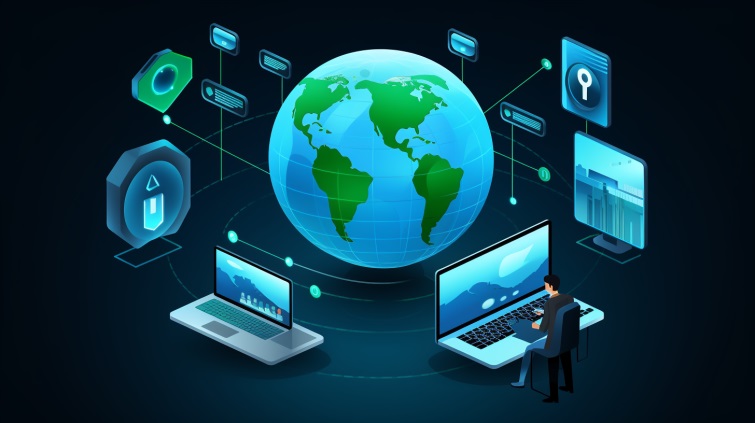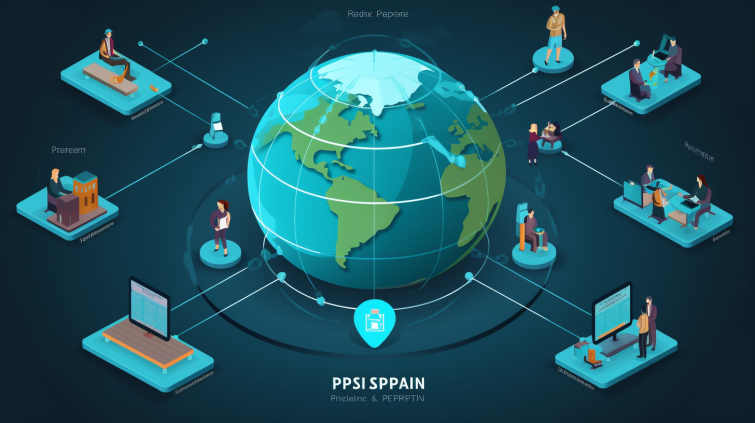
In an era where our every digital step leaves traces, the quest for secure communication has become more critical than ever. Picture this: from ancient encryption methods in Rome to the groundbreaking VPN technology of today, our need for confidentiality has woven a fascinating tapestry throughout history.
Embark on a journey through time as we unravel the intricate threads of “VPN Technology: A Historical Odyssey.” This comprehensive guide transcends mere exploration—it’s a revelation of the captivating evolution of secure communication. Delve into the depths of early encryption techniques, witness the rise of VPNs from corporate fortresses to individual shields, and navigate the intricate protocols that safeguard our digital interactions.
Table of Contents
By reading this article you can:

Unlock the Secrets of Secure Communication: Discover the ancient encryption methods employed by civilizations and witness the challenges they faced. Explore the evolution from the Caesar cipher to sophisticated mechanical encryption machines like the Enigma.
Untangle the Roots of VPN Technology: Trace the origins of VPNs back to 1996 and witness their transformation from exclusive business tools to indispensable components of individual users’ privacy strategies. Uncover the pivotal role VPNs play in ensuring secure communication in an interconnected world.
Demystify VPN Protocols: Dive into the world of VPN protocols, from the early days of PPTP and L2TP/IPSec to the modern efficiency of WireGuard. Stay tuned for an upcoming exploration of notable protocols, each contributing its unique strengths and applications.
VPNs in Realms Beyond: Explore how VPNs have transcended the corporate sphere to become indispensable assets in government, military, and everyday life. Witness their crucial role in securing classified information, overcoming censorship, and fostering global connectivity.
Remote Access Revolution: In the dynamic landscape of remote work, understand how VPNs have become the linchpin, ensuring secure and efficient connectivity for employees working from diverse locations. Uncover the benefits of remote access VPNs and their role in the modern business environment.
Encryption’s Vanguard: Delve into the advancements in encryption that form the backbone of VPN technology. From AES-256-bit key encryption to quantum-safe protocols, understand how the industry stays ahead of emerging threats.
Consumer VPN Revolution: Witness the paradigm shift as VPNs transition from enterprise-centric solutions to indispensable tools for consumers. Explore the factors driving their popularity, from online security concerns to overcoming geo-restrictions and ensuring economic benefits.
Challenges and Controversies: Acknowledge the limitations and controversies surrounding VPNs, from physical infrastructure challenges to legal and ethical ambiguities. Navigate the complex landscape of VPN usage with a nuanced understanding.
Future Trends in VPN Technology: Peek into the crystal ball of VPN technology’s future. Anticipate trends like AI-powered VPNs, quantum-safe protocols, decentralized VPNs, and more, shaping the landscape of secure communication.
Embark on this riveting exploration as we unravel the past, present, and future of VPN technology. Your digital journey begins here—don’t miss the chance to fortify your understanding of secure communication in the ever-evolving digital fortress. Read on and empower yourself in the world of VPNs.
Early Concepts of Secure Communication

Evolution of Secure Communication: From Ancient Techniques to Modern Cryptography
In the early days of the internet, the need for secure communication became evident as a significant portion of our communication transitioned to this digital medium. The internet, relying on millions of interconnected computers, left traces of our communication and personal information along the way. The sheer volume of information exchanged could be combined to identify individuals, necessitating measures to keep communication private and limit the information left behind.
Early Encryption Methods and Challenges
Encryption emerged as a fundamental method to ensure the confidentiality of communication. Early encryption methods, such as the Caesar cipher dating back to ancient Rome, involved shifting each letter by three positions in the alphabet. While foundational, simple substitution ciphers like the Caesar cipher had vulnerabilities, susceptible to brute force or frequency analysis.
In parallel, ancient civilizations, including the old Persian Empire, recognized the strategic importance of encryption in secure military and political communication. Encryption methods in The Ancient Persian Empire were sophisticated, reflecting the advanced administrative and communication systems of the empire.
Medieval Innovations and Challenges
As history progressed, encryption methods evolved. In medieval England, scribes encrypted notes, riddles, and colophons, creating a form of security through obscurity. However, challenges persisted, such as the need for both sender and receiver to possess the same encryption method, limiting widespread use.
The ancient Greeks, notably the Spartans, contributed the scytale cipher—a cylindrical device used in military communications during campaigns. The scytale’s design ensured secure communication for military commanders, but challenges remained in standardizing encryption methods across different regions and cultures.
Mechanical Engineering and Advancements
The development of mechanical engineering brought forth new encryption methods. Machines like the Enigma, used by the Germans in WWII, demonstrated the power of automating encryption key generation. These machines employed rotating rotors to create complex and secure encryption keys.
In the 16th century, the Vigenère cipher emerged as a more advanced technique, using a repeating key to protect against frequency attacks. Despite innovations, weaknesses were eventually identified, emphasizing the need for continuous improvement in encryption methods.
Asymmetric Encryption and Hash Functions
Asymmetric encryption marked a groundbreaking development, eliminating the need to transmit the secret key to the message recipient. Public key cryptography allowed secure communication without compromising the secrecy of the key. Hash functions became integral for verifying message integrity, ensuring the authenticity of received messages.
Modern Cryptography Principles
Modern cryptography builds on principles of secrecy, emphasizing the importance of secure key exchange and message authentication. Technologies like TLS in online transactions exemplify the application of these principles. The secrecy of messages now relies on the secrecy of the key, not solely on the encryption system.
In conclusion, the journey of secure communication through encryption spans millennia, from ancient techniques rooted in secrecy and obscurity to modern cryptographic principles. The evolution reflects the continuous effort to stay ahead of potential threats and adapt to the changing landscape of communication.
Emergence of VPNs – VPN Evolution

VPN technology traces its roots back to 1996 when Gurdeep Singh-Pall, a Microsoft employee, pioneered the development of the Peer-to-Peer Tunneling Protocol (PPTP). This innovative protocol laid the foundation for creating more secure private connections between user devices and the internet. PPTP, while no longer prevalent in modern VPN infrastructure, marked the inception of VPN technology, opening the doors to secure online communication.
The initial purpose of VPNs was primarily geared towards business applications. In the early 2000s, businesses recognized the need for secure and private communication channels. VPNs offered a solution by allowing organizations to access their private networks securely. This capability enabled companies to facilitate secure file sharing between different offices, ushering in a new era of streamlined and secure communication.
As encryption standards improved and new tunneling protocols emerged, individuals became increasingly aware of online threats and privacy concerns. Notably, events like WikiLeaks and Edward Snowden’s revelations heightened the public’s consciousness about the vulnerabilities of online privacy. Around 2017, the revelation that ISPs in the United States could collect and sell users’ browsing history triggered a surge in the demand for VPNs among individual users.
Early Use Cases and Industries Adopting VPNs
Originally, VPN technology served as a dedicated tool for large corporations and organizations. These entities utilized VPNs to establish secure and private communication channels between different offices, allowing employees to access critical company data remotely. The technology played a crucial role in securing corporate networks, especially when employees needed to work from various locations.
Over time, as encryption standards became more robust, VPNs evolved from exclusive business tools to accessible solutions for individual users. Around 2005, third-party VPN providers entered the market, making VPN technology available to the general public. This transition marked a significant shift as people began to recognize the broader benefits of VPNs beyond corporate applications.
The increasing awareness of online privacy rights, coupled with privacy scandals and the rise of geo-restricted content platforms, further fueled the popularity of VPNs among consumers. VPNs became instrumental in bypassing censorship in regions with strict internet usage policies, such as Russia, China, and the Middle East.
In summary, the evolution of VPN technology began with its roots in the business world, addressing the need for secure and private communication. As encryption standards improved and the internet landscape evolved, VPNs transitioned from exclusive corporate tools to essential components of individual users’ online privacy strategies.
Development of Protocols
The evolution of Virtual Private Networks (VPNs) can be traced back to the fundamental building blocks known as VPN protocols. These protocols serve as the backbone, governing how data is securely transmitted between your device and the chosen VPN server. In this section, we’ll delve into the development of VPN protocols, their significance, and the pivotal role they play in ensuring the confidentiality, integrity, and authenticity of your data.
Introduction of the First VPN Protocols
In the early days of the internet, the need for secure communication paved the way for the inception of VPN technology. The basic functionality of all VPN protocols is similar, creating an encrypted tunnel to safeguard your data from potential threats such as hackers, ISPs, and government entities. This tunnel acts as a protective shield, ensuring your online activities remain private and secure.
As the internet landscape evolved, the demand for more robust and efficient VPN protocols became apparent. The historical context of secure communication in the nascent stages of the internet prompted the development of the first VPN protocols. These protocols laid the groundwork for the secure transmission of data, marking a significant milestone in the realm of online privacy.
Emergence of VPN Protocols

The origins of VPN technology can be attributed to the emergence of specific protocols designed to address the security challenges of the early internet. Notable among these is the Point-to-Point Tunneling Protocol (PPTP), which, despite its simplicity and ease of setup, faced security vulnerabilities and has since been phased out by major VPN providers.
The subsequent Layer 2 Tunneling Protocol (L2TP) improved upon PPTP’s security by often pairing with IPsec for added protection. L2TP/IPsec became a popular choice for those prioritizing security and compatibility across various devices.
The advent of OpenVPN in 2001 marked a significant leap forward in VPN technology. OpenVPN, being open source, garnered widespread adoption due to its configurability, compatibility, and robust security features. Its ability to operate over both TCP and UDP protocols provided users with flexibility and options tailored to their specific needs.
Spectrum of VPN Protocols
The landscape of VPN protocols expanded to encompass a variety of options, each with its own strengths and weaknesses. PPTP, while outdated and vulnerable, remains accessible for users seeking quick setups and compatibility with legacy systems. L2TP/IPSec, with its dual encapsulation and compatibility, caters to those valuing security and stability.
OpenVPN, a stalwart in the VPN protocol realm, is known for its open-source nature, robust encryption, and versatility across different platforms. However, its configuration complexity and potential impact on internet speeds are factors to consider.
The introduction of Secure Socket Tunneling Protocol (SSTP) provided Windows users with a secure option that could traverse firewalls, ensuring privacy in restrictive network environments.
Furthermore, Internet Key Exchange version 2 (IKEv2) distinguished itself with efficient performance and the ability to quickly re-establish connections, making it ideal for mobile users.
The innovative WireGuard protocol emerged as a modern solution to the drawbacks of traditional VPN protocols, boasting simplicity, speed, and security. Despite its limited availability across all VPN services and devices, WireGuard’s efficiency and stability make it a compelling option.
Notable Protocols and Their Contributions
While this section provides an overview of the development and emergence of VPN protocols, a more in-depth exploration of notable protocols and their specific contributions will be covered in a separate article. Stay tuned for a closer look at protocols such as PPTP, L2TP/IPSec, OpenVPN, SSTP, IKEv2, and the modern WireGuard, exploring their unique features and applications in greater detail.
VPNs in Business and Government

In recent years, the adoption of Virtual Private Networks (VPNs) has undergone a remarkable surge, transforming them from niche tools into indispensable assets across various sectors, particularly in business and government. This section explores the pivotal role VPNs play in corporate networks, their growth trajectory, and their significance in government and military communications.
VPN Usage in Corporate Networks
In the dynamic landscape of corporate networks, the utilization of VPNs has become integral to ensuring secure and private communication. Statistical insights reveal a robust trend, showcasing the broader adoption of VPNs beyond initial niche industries.
Key Statistics:
A substantial majority, around 50% of respondents, reported using VPNs for business purposes.
Among these, 40% use VPNs for personal streaming, demonstrating the versatility of VPNs in meeting both professional and personal needs.
Insight:
The dual-purpose adoption of VPNs in corporate environments reflects their versatility. Designed initially for securing business communications, VPNs are now trusted for a spectrum of activities, indicating a growing reliance on these networks.
The Role of VPNs in Government Communications
Government agencies, in their pursuit of safeguarding sensitive information, have increasingly turned to VPNs to fortify their communication infrastructure. The utilization of VPNs in government communications is driven by the need for enhanced security and privacy in an era marked by increased cyber threats.
Relevant Regulations:
Statistics indicate that over 80% of government employees use VPNs, demonstrating a comprehensive approach to secure data transmission.
Various regulations, such as the National Institute of Standards and Technology (NIST) Framework and the Commercial Solutions for Classified (CSFC) Program, govern the use of VPNs, ensuring a robust cybersecurity posture.
Significance:
VPNs offer a secure conduit for government entities to transmit classified information, ensuring data integrity and confidentiality. As telework becomes more prevalent, VPNs emerge as critical tools in maintaining secure government communication channels.
The Role of VPNs in Military Communications
For individuals serving in the military, the benefits of VPNs extend beyond conventional cybersecurity. Military personnel stationed abroad face unique challenges, and VPNs prove instrumental in addressing privacy concerns, overcoming censorship, and facilitating communication with loved ones.
Key Military VPN Benefits:
Privacy and Security:
Over 90% of military personnel actively use VPNs to encrypt internet connections, shielding themselves from potential cyber threats in unfamiliar networks.
Bypassing Censorship:
VPNs empower military members to circumvent internet censorship prevalent in certain regions, ensuring access to vital information and services.
Staying Connected:
VPNs enable seamless communication with family and friends through unrestricted access to communication programs and VOIP services.
Recommendation:
For military personnel seeking a reliable VPN, VyprVPN stands out as an ideal choice, offering robust security features and supporting a free and open internet experience.
The integration of VPNs in business, government, and military spheres underscores their evolving role from specialized tools to universal safeguards. As technology continues to advance, statistical trends and usage patterns observed in 2023 emphasize the enduring importance of VPNs in an increasingly interconnected and digital world, positioning them as indispensable components of modern communication strategies.
VI. VPNs for Remote Access

In the dynamic landscape of the modern global business environment, the need for secure and efficient remote access has become paramount. As businesses expand globally, employees often find themselves working from various locations, requiring seamless and secure connectivity to corporate networks. The rise of remote work has accentuated the importance of Virtual Private Networks (VPNs) for facilitating this transition. Let’s delve into the key aspects of VPNs in the context of remote access.
How Does a Remote Access VPN Work?
A remote access VPN serves as a technological bridge, allowing users to securely connect to a private network from any remote location with internet access. This connection is established by creating a secure “tunnel” over the public internet, connecting the user’s device to the private network. The process begins when the user initiates a connection to the VPN server through dedicated software. Authentication processes follow, involving credentials, tokens, or multi-factor verification to ensure the user’s legitimacy.
Utilizing protocols like Point-to-Point Tunneling Protocol (PPTP) or Layer 2 Tunneling Protocol (L2TP) in conjunction with encryption standards such as IPsec or SSL/TLS, the VPN server creates a secure tunnel for data transmission. This encrypted conduit ensures that the user’s data remains confidential during transit, appearing as unintelligible gibberish to potential eavesdroppers.
The Shift Towards VPNs for Remote Access to Corporate Networks
The traditional model of in-office work has evolved, with remote work becoming increasingly prevalent. VPNs play a pivotal role in this shift, providing a secure and reliable means for employees to access corporate resources from diverse locations. Imagine a sales representative needing to access company resources from a hotel room or an employee working efficiently from the comfort of their home – a remote access VPN makes this possible.
Benefits of Remote Access VPNs:
- Secure Access: Ensures a safe environment for accessing organizational resources from any remote location, safeguarding data from potential eavesdroppers.
- Mobility and Flexibility: Allows users to connect from anywhere with an internet connection, promoting telecommuting and enabling work on the go.
- Cost-efficient: Eliminates the need for dedicated leased lines for remote connections, relying on the public internet while maintaining security.
- Easy Collaboration: Facilitates secure access and sharing of resources, files, and applications, fostering collaboration among geographically distributed teams.
- Centralized Data Management: Enhances data security by keeping it in the central office or data center, simplifying management, backup, and security processes.
VPNs’ Role in Facilitating Remote Work

The advent of remote work has propelled VPNs into a critical role, ensuring that employees can securely connect to the corporate network regardless of their physical location. This paradigm shift has numerous advantages:
- Enhanced Productivity: By offering a secure means for employees to access necessary resources remotely, businesses can maintain productivity even outside traditional office environments.
- Flexibility for Mobile or Remote Workers: Remote access VPNs cater to the needs of a workforce that operates from various locations, providing secure access to resources wherever employees may be.
- Compatibility Across Devices: Remote access VPNs can be seamlessly deployed on various devices, including desktops, laptops, tablets, and smartphones, ensuring accessibility irrespective of the device in use.
In conclusion, VPNs for remote access represent a fundamental component of the contemporary work landscape, fostering secure connectivity and enabling a geographically dispersed workforce. As businesses continue to embrace the benefits of remote work, the role of VPNs in facilitating secure access to corporate networks becomes increasingly indispensable.
Advancements in Encryption
In the rapidly evolving landscape of VPN technology, encryption plays a pivotal role in ensuring the security and privacy of data transmission. Recent developments in VPN encryption protocols reflect the ongoing efforts to address emerging challenges and meet users’ diverse needs.

Evolution of VPN Encryption Algorithms
The historical journey of VPNs traces back to early encryption methods such as the Transfer Control Protocol/Internet Protocol (TCP/IP) and the Point-to-Point Tunneling Protocol (PPTP). While these protocols paved the way for VPNs, concerns about compromised security led to the development of more sophisticated encryption systems.
Today, VPNs deploy a range of encryption algorithms, each with its own strengths and considerations. Notably, OpenVPN, a stalwart in the VPN protocol market for over two decades, utilizes AES-256-bit key encryption, 2048-bit RSA authentication, and a 160-bit SHA1 hash function. These specifications make OpenVPN one of the most robust protocols against potential threats, including those posed by quantum computing.
Hybrid VPN Protocols: IKEv2/IPSec and L2TP/IPSec
As the demand for both speed and security continues to rise, hybrid VPN protocols have emerged as a solution. Combining protocols like IKEv2/IPSec and L2TP/IPSec enhances both the speed and security of internet connections.
- IKEv2/IPSec: Known for its fast internet speed, IKEv2 focuses on authentication and creates a secure VPN tunnel. To ensure a safe encrypted tunnel, it is often combined with IPSec, offering users a balance between speed and security.
- L2TP/IPSec: While providing robust encryption with a two-layer protection approach, L2TP/IPSec may experience a reduction in browsing speed. Despite this, it remains a viable option for users prioritizing data security over speed.
Quantum-Safe VPN Protocols
The advent of quantum computing poses new challenges to traditional encryption methods. Users are increasingly concerned about the potential vulnerabilities, leading to the development of quantum-safe VPN protocols.
Quantum-safe VPNs utilize Post Quantum Cryptography, enhancing encryption to withstand the computational power of quantum computers. OpenVPN’s use of AES-256-bit key encryption, along with advancements in quantum-resistant algorithms, ensures a secure defense against potential quantum threats.
Advancements and Improved Security
In response to the dynamic threat landscape and increasing connectivity, VPN providers continually enhance their encryption methodologies. Advancements in encryption contribute significantly to improved security by safeguarding against evolving cyber threats. As cyberattacks become more sophisticated, VPN protocols like OpenVPN and emerging options like WireGuard aim to stay ahead by refining their encryption techniques.
In conclusion, the advancements in VPN encryption underscore the industry’s commitment to providing users with secure, private, and high-speed internet experiences. The integration of quantum-safe protocols and the continuous improvement of existing encryption algorithms demonstrate a proactive approach to addressing the challenges of the digital age.
Rise of Consumer VPNs
In recent years, the landscape of Virtual Private Networks (VPNs) has undergone a significant shift, transitioning from being primarily utilized by enterprises to becoming an integral part of consumers’ online experiences. The surge in VPN usage among the general public is attributed to various factors, as outlined below.

1. Increasing Concerns About Online Security and Privacy
The escalating number of cybersecurity threats, data breaches, and online surveillance has heightened individuals’ awareness of the vulnerabilities associated with internet use. As a response to these concerns, consumers are turning to VPNs as a crucial tool for safeguarding their online activities.
2. Anonymity and Protection from Cyber Threats
The anonymity offered by VPNs has become a pivotal factor in their adoption. By allowing users to explore the internet from different location servers, VPNs shield personal information and protect against targeted cyber-attacks. This feature is particularly appealing to individuals looking to maintain their privacy in an era of increasing digital scrutiny.
3. Overcoming Geo-Restrictions for Content Access
As the internet’s vast sources of entertainment and information are often subject to geo-restrictions, VPNs have become instrumental in bypassing these limitations. Consumers use VPNs to access websites and entertainment channels that might be restricted in their geographic location, providing a more inclusive online experience.
4. Economic Benefits in Shopping and Traveling
Consumers are discovering the economic advantages of using VPNs, particularly in the realms of online shopping and travel. By accessing the internet through servers in different countries, individuals can explore varied pricing options for flights and online products. This approach, though requiring some effort, can lead to substantial cost savings.
5. Enhanced Cybersecurity in Public Wi-Fi Environments
Public Wi-Fi networks, while convenient, pose significant security risks. The rise of remote work and travel has increased reliance on public Wi-Fi, making individuals susceptible to data breaches and malware attacks. VPNs address these vulnerabilities by providing a secure tunnel for online activities, ensuring that personal information remains confidential.
The Transition from Enterprise to Consumer Use
The evolution of VPNs from enterprise-centric solutions to consumer-oriented tools signifies a broader societal shift towards prioritizing online security and privacy. As consumers become more informed about the potential threats in the digital realm, the demand for accessible and user-friendly VPN services continues to grow.
1. Cloud Migrations Driving VPN Usage in Enterprises
Enterprises, in their pursuit of digital transformation, are increasingly migrating data to the cloud. This shift necessitates secure and remote access to sensitive information, leading to a surge in VPN adoption. Large contracts with VPN providers indicate a rising trend in enterprises prioritizing network security as they centralize data in the cloud.
2. Consumer Awareness and Concerns Boost VPN Popularity
Consumer VPN usage is propelled by a heightened awareness of data privacy issues. With over 95% of Americans expressing concerns about how companies handle their data, VPNs have emerged as a practical solution for individuals seeking control over their online privacy. The industry’s response to these concerns includes user-friendly interfaces and a variety of VPN options catering to different needs.
3. Anticipated Trends: Faster and More Secure VPNs
As the demand for VPNs continues to rise, the industry is expected to witness advancements in speed, security, and features. Competition among VPN providers is likely to result in faster and more secure offerings, with a potential integration of additional features like firewalls. This evolution reflects a commitment to meeting the evolving needs of both enterprises and consumers in the ever-changing landscape of cybersecurity.
Factors Contributing to the Popularity of VPNs Among the General Public
The surge in consumer VPN popularity can be attributed to a combination of growing cybersecurity threats, increased awareness of online privacy, and the tangible benefits offered by these services. The transition from enterprise to consumer use is a testament to the evolving digital landscape and the critical role VPNs play in safeguarding personal and sensitive information.
Challenges and Controversies
The adoption of VPNs has undeniably transformed the digital landscape, yet their efficacy is not without challenges. Examining the drawbacks outlined in various sources provides a comprehensive understanding of the limitations and controversies surrounding VPN technology.
- VPN Physical Limitations: The surge in remote work, especially following the disruptions of 2020, exposed a critical flaw in traditional VPNs. Many organizations found their VPN infrastructure physically limited, with on-premises appliances unable to scale effectively to support the sudden influx of remote users1. Bandwidth constraints and outdated specifications left businesses grappling with creative but unsustainable solutions, such as limiting VPN access or investing in secondary alternatives1.Addressing this challenge requires a paradigm shift towards scalable, cloud-based solutions that can accommodate the dynamic nature of modern remote work environments.
- Productivity-Security Dilemma: VPNs have long been at the center of the productivity-security debate. Organizations face the perennial question of whether to prioritize productivity by granting broad access or to enhance security by routing all traffic through the VPN infrastructure1. The result is often a compromise that leaves both productivity and security compromised.Striking a balance demands innovative approaches, perhaps integrating VPNs with advanced security measures, ensuring a seamless user experience without compromising network safety.
- Mobile Limitations: The design of VPNs, originally tailored for setups with stable connections, poses challenges in the mobile era. Mobile devices, with their frequent network changes and sleep modes, disrupt VPN connections, affecting app responsiveness and user experience1. This becomes a critical concern in an age where typical knowledge workers interact with their mobile devices nearly a hundred times a day1.Future advancements in VPN technology must address the unique demands of mobile usage, ensuring uninterrupted connections and improved responsiveness.
- Adaptability to the Modern Workforce: Traditional VPNs were conceived in an era where organizations maintained strict control over devices. Today’s reality involves a diverse range of remote users, using their own devices and collaborating beyond organizational boundaries1. VPNs, often tied to company-managed devices, fail to accommodate the Bring Your Own Device (BYOD) trend and collaboration with external parties.To address this, the evolution of VPNs should prioritize adaptability to diverse devices and collaboration scenarios, ensuring secure connectivity regardless of the user’s affiliations.
Controversies Surrounding VPN Usage
The controversies surrounding VPNs extend beyond technical challenges to legal and ethical dimensions. Understanding these aspects is crucial for navigating the complex landscape of VPN usage.
- Legal Ambiguities: The legal status of VPNs varies globally, with some countries imposing restrictions or outright bans on their usage2. While VPNs are essential tools for online privacy and circumventing censorship, certain governments view their use with suspicion, particularly during politically sensitive times3.The legal ambiguity necessitates a nuanced approach, recognizing the importance of VPNs in safeguarding privacy while staying informed about the regulatory landscape.
- Ethical Considerations: The ethical dimension of VPN usage comes into focus when considering the role VPNs play in circumventing restrictions imposed by governments or organizations. While VPNs empower individuals to access information freely, they may also be misused for illicit activities, posing ethical dilemmas3.Users and organizations must navigate these ethical considerations responsibly, promoting a balanced approach that respects individual privacy while upholding legal and ethical standards.
In conclusion, while VPNs have revolutionized secure communication, acknowledging and addressing these challenges and controversies is pivotal for fostering a robust and ethical VPN landscape.
Future Trends in VPN Technology

In today’s rapidly evolving digital landscape, VPNs are undergoing transformative changes, paving the way for a future characterized by innovation and adaptability. As technology advances, the future of VPNs promises a wave of trends and innovations that will reshape the way we perceive and use these essential tools.
AI-Powered VPNs: Transforming Security and User Experience
One of the most exciting prospects in VPN evolution is the integration of Artificial Intelligence (AI). AI-powered VPNs leverage advanced algorithms to analyze network patterns, predict cyber threats, and optimize VPN connections in real-time. This adaptive technology ensures not only enhanced security but also seamless user experiences. Imagine a VPN that learns and adapts to emerging threats, providing users with a dynamic and proactive defense against online risks.
Quantum-Safe VPNs: Fortifying Security in the Quantum Era
As quantum computing emerges as a potential threat to traditional encryption methods, the development of Quantum-Safe VPNs becomes imperative. These VPNs employ quantum-resistant algorithms, ensuring data security even in the face of quantum attacks. The marriage of cutting-edge VPN technology and quantum-resistant encryption provides users with a robust shield against evolving cyber threats.
Decentralized VPNs: Embracing Privacy in a Peer-to-Peer Network
The rise of blockchain technology has given birth to Decentralized VPNs (dVPNs). These innovative solutions eliminate central servers, enhancing user privacy and reducing the risk of data breaches. In a peer-to-peer network, users can securely share their internet bandwidth, creating a truly decentralized internet experience. This evolution aligns with the growing demand for enhanced online privacy and user control over personal data.
Multi-Cloud VPNs: Navigating the Complexities of Modern Business
In response to the increasing reliance on multi-cloud environments, VPNs are evolving to provide seamless integration across various cloud platforms. Multi-Cloud VPNs offer unified connectivity, facilitating secure data exchange between different cloud services and on-premises infrastructures. This development caters to the dynamic needs of businesses operating in complex and distributed digital landscapes.
Edge Computing and VPNs: Ensuring Secure Communication in Real-Time
With the advent of edge computing, which processes data closer to the source, VPNs are optimizing their capabilities for efficient communication between edge devices and central servers. VPNs tailored for edge computing environments ensure swift data transmission, low latency, and robust security protocols. This integration becomes crucial as more applications demand real-time processing at the edge of the network.
Privacy-Focused VPNs: Meeting the Demand for Enhanced Anonymity
Heightened awareness of digital privacy has led to the development of Privacy-Focused VPNs. These VPNs boast strict no-logs policies, advanced encryption methods, and innovative features to protect user anonymity. Users now have the means to exert greater control over their online presence, aligning with the growing concern for digital privacy rights.
5G VPNs: Pioneering High-Speed, Low-Latency Connections
The rollout of 5G networks introduces new possibilities for VPNs. 5G-enabled VPNs leverage high-speed, low-latency connections to provide seamless and secure internet access on mobile devices. This evolution supports emerging technologies like Augmented Reality (AR) and Virtual Reality (VR), expanding the scope of VPNs beyond traditional connectivity.
Customizable VPN Experiences: Tailoring Security to Individual Needs
Future VPNs will offer customizable experiences, empowering users to tailor their VPN connections based on specific needs. Customization options may include varying levels of encryption, optimized server selection, and application-specific VPN settings. This shift ensures personalized and efficient VPN usage, catering to the diverse requirements of individual users.
In considering the future of VPN technology, these trends and innovations represent a dynamic landscape that adapts to the evolving digital sphere. As users explore these advancements, one can’t help but recognize that the future of VPNs is not just about adapting to change but actively shaping it. Trust in the evolution of VPNs, and consider these exciting developments as you navigate the ever-changing landscape of online security.
Conclusion
As we reach the culmination of our journey through the annals of secure communication, it becomes evident that the evolution of VPN technology is not just a historical odyssey—it’s a testament to our relentless pursuit of privacy in the digital age. From ancient encryption methods etched in the scrolls of time to the quantum-safe protocols of tomorrow, the threads of this narrative weave a tapestry of resilience and innovation.
In our exploration, we’ve witnessed the rise of VPNs from humble beginnings in corporate corridors to becoming the guardians of individual privacy. We’ve delved into the intricate world of protocols, where each acronym signifies a chapter in the story of safeguarding our digital interactions. The realm of VPNs has extended beyond boardrooms, reaching the corridors of government, the barracks of the military, and the homes of everyday users seeking a shield against digital threats.
The remote work revolution has propelled VPNs into a pivotal role, ensuring that the digital bridges connecting us to corporate networks remain secure, regardless of our geographical location. Encryption, the vanguard of VPN technology, stands as an unyielding defense against the ever-evolving threats lurking in the digital shadows.
As consumers, we’ve embraced VPNs not just as tools but as allies in the quest for online security. Overcoming geo-restrictions, ensuring economic benefits, and enhancing cybersecurity in an era of public Wi-Fi vulnerabilities—VPNs have become indispensable companions in our digital escapades.
Yet, as we celebrate the triumphs, we must acknowledge the challenges and controversies that accompany the adoption of VPNs. From the physical limitations of traditional infrastructures to the legal and ethical ambiguities that cloud their usage, a nuanced understanding is crucial in navigating this complex landscape.
And now, as we cast our gaze toward the future, we anticipate a new chapter in the saga of VPN technology. AI-powered sentinels, quantum-safe guardians, decentralized gatekeepers—the future promises innovations that will redefine the contours of secure communication.
In the ever-evolving digital citadel, the journey doesn’t end; it transforms. The tools we wield to safeguard our digital presence adapt, innovate, and fortify. As we stand at the crossroads of history and the future, let this comprehensive guide serve as your compass—a guide to navigating the digital citadel with wisdom, resilience, and an unwavering commitment to securing the whispers of our digital conversations. The story continues, and you, equipped with the knowledge within these pages, are the protagonist in the ongoing narrative of VPN technology.
